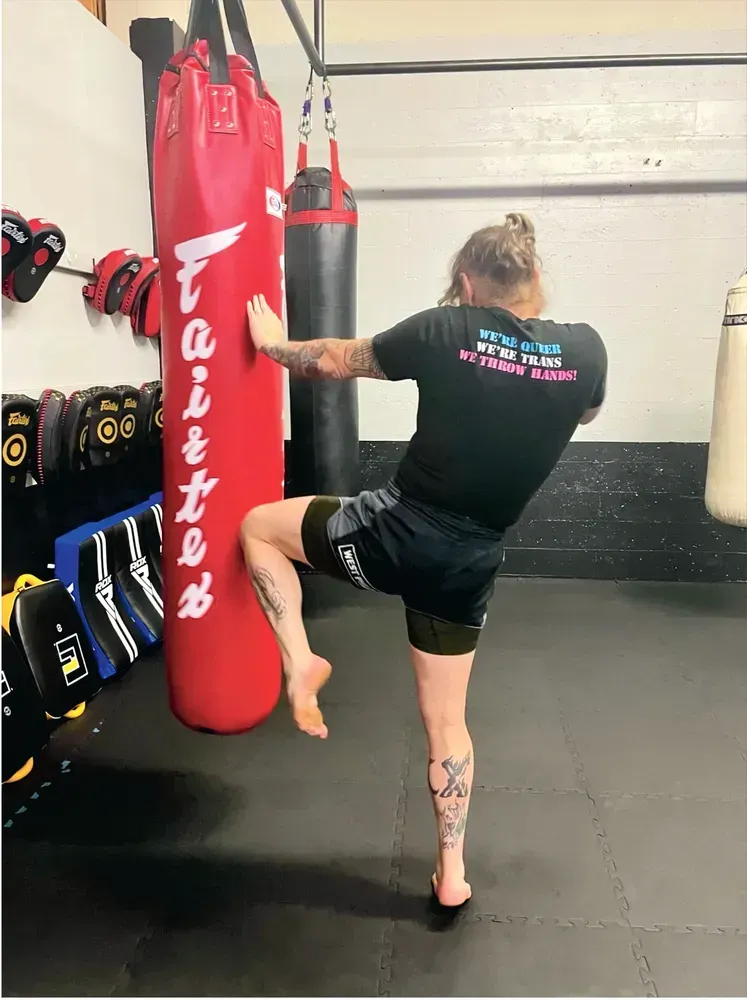If you’re walking through a park this summer and see a gaggle of people gleefully kicking and punching (and kneeing and elbowing) each other, you may have stumbled across the Red Pandas!
Red Panda Muay Thai martial arts school, which first opened its doors in August of 2024, is dedicated to teaching the art of Muay Thai, with a focus on serving the expansive Queer and Trans community.
Muay Thai (Thai kickboxing) is often considered the most effective stand-up striking art — and it’s also a great full-body workout. Training consists of learning how to effectively throw and defend against a variety of strikes, footwork drills, clinching (stand-up grappling), punching bag and pad rounds, live sparring, conditioning, and more. At Red Panda, emphasis is placed on consent, control, and learning proper techniques.
In this political climate, in which many Queer, Trans, and other marginalized people are struggling with mental health and often feel unsafe and unaccepted, the benefits of self-defense training can include increased endorphins, improved confidence, practicing nervous system regulation, and the opportunity to join a wonderfully supportive community.
As founding coach Abby said, “It has been my experience that there has always been a shortage of spaces to safely train martial arts for those who come from various marginalized communities. This was upheld by a one-size-fits-all approach to training, which I have to admit was incredibly toxic in the expectations of what each student should have to go through in order to ‘survive’ the process … and turn a casual hobbyist into a ‘fighter.’
“I found a different way forward when I went to Thailand and connected with the sport at its point of origin and discovered how playful and whimsical the professional practitioners were in both attitude and approach.
“I started Red Panda knowing it was possible to alter some of the most toxic aspects of commercial training that shut people out at entry level and replace them with practices that centered consent and an awareness of trauma, as well as the many different types of needs that potential students might have. Basically, breaking the one-size-fits-all [approach] and replacing it with a curriculum that held space for the many sizes that different folks might require.”
Many Trans people who wished to or used to train in martial arts before transitioning have finally been able to find a gym to train at that actively supports them, including many people from out of town, who have been able to join the space to participate in tournaments. For many, combat sports can be a practice in fully embodying oneself.
Lily's story
One visiting fighter, Lily, shared her story: “I got beaten up a lot as a kid but didn’t start training martial arts until my early twenties. I ended up training Muay Thai in rural Isan in Thailand. My gym offered me a fight, and although I got beaten up, it was one of the best nights of my life.
“I had spent a lot of time before that fight feeling really dissociated from my body — as someone who did not know I was a woman, I did not process what I was feeling as gender dysphoria. I was just like ‘Well, I hate every part of my physical form.’
“But the first time I fought, I was so present and unmasked, grounded and unself-conscious, and just there in a way that I’m not in most of my life. I fell in love with it. I was able to fight 12 times in Thailand at funerals, high schools, and local holiday celebrations. I had eight wins and four losses.
“However, the gym I trained at treated me as a kind of a novelty who they could have fight anyone for a little extra money. They didn’t give me any training, and they were not uplifting or encouraging me in any way. The worst mismatch I had, I got a severe concussion. [So] I identified that the risks outweighed the benefits, and decided to train for fun back in the States.
“Unfortunately, at every gym I tried, the vibes went from being actively hate-crimed to just… not great. Fighting was for years something that I did in spite of all of the discomfort that I had to endure, so eventually, I stopped.
“Seven years later, I found Red Panda when I saw an Instagram post for a Queer/Trans Muay Thai tournament. [I] figured, with my ring experience, I could be a fun first or second fight for someone as some sort of midlevel henchwoman. However, after being matched with an experienced opponent, I asked to join Red Panda’s fight camp.
“I wasn’t expecting to socialize— I’m awkward and my experience at gyms had not been great — but people just kept being really brave and unmasked and vulnerable in that space, and I kept seeing that be modeled and positively reinforced during fight camp. Getting to do this thing that I had always loved in a space that felt warm, collaborative, and encouraging — it’s genuinely been life-changing and a radical shift for me in how combat sports can be practiced, taught, and learned.
“It’s the best gym I’ve gotten to train at! (Though perhaps I’m biased since I’ve coached there myself!)”
Mutual support
Lily lives in California but is not the only fighter to travel from out of state, with several competitors traveling internationally for the opportunity to safely compete. For those who are able to stay and train at Red Panda, what sets it apart from other gyms is the strong sense of community and support that members give each other. As one of Red Panda’s fighters, C, shared:
“Coach Abby emphasizes having a nonhierarchical culture, where everyone is a coach to everyone else, and we can all advocate about our training needs to each other. In addition to fighting and competing with Red Panda, I’ve also had the privilege of getting to corner for my teammates as well during their fights!
“Fighting and training can often feel lonely and isolating, but at Red Panda, we treat it like the team sport that it is. Every successful fighter has a strong support team behind them, and getting to coach and cheer for each other and help each other improve is a big part of what makes Red Panda so comfortable for me.”
Red Panda has another fight event coming up in August in conjunction with several other Queer- and Trans-centered martial arts organizations, so fighters will soon be starting upping the intensity and regularity of their training.
Fighting is optional, though, and there are always supporting roles, such as refereeing, timekeeping, and coaching. Beyond opportunities to test our skills, Red Panda members are also looking forward to a summer of community events, such as BBQs, beach hangs, movie nights, and of course, training together.
Red Panda is on Instagram at @@redpandaboxing, and is soon to be relocated near the light rail station on Capitol Hill. Red Panda offers both beginner and advanced classes. Operating under a culture of consent, all exercises are opt-in and modifiable. Free trial classes are available as well as sliding-scale memberships, and loaner gear is available at the gym.
Support the Seattle Gay News: Celebrate 51 Years with Us!
As the third-oldest LGBTQIA+ newspaper in the United States, the Seattle Gay News (SGN) has been a vital independent source of news and entertainment for Seattle and the Pacific Northwest since 1974.
As we celebrate our 51st year, we need your support to continue our mission.
A monthly contribution will ensure that SGN remains a beacon of truth and a virtual gathering place for community dialogue.
Help us keep printing and providing a platform for LGBTQIA+ voices.
How you can donate!
Using this link: givebutter.com/6lZnDB
Text “SGN” to 53-555
Or Scan the QR code below!



